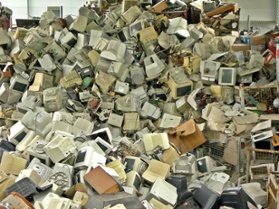 company should be concerned about the risk of environmental non-compliance in the IT recycling process. The earth won’t be the only thing that suffers from an environmentally unsound IT recycling process. If your company doesn’t recycle its used electronics according to all environmental regulations and best practices, it risks:
company should be concerned about the risk of environmental non-compliance in the IT recycling process. The earth won’t be the only thing that suffers from an environmentally unsound IT recycling process. If your company doesn’t recycle its used electronics according to all environmental regulations and best practices, it risks:
- Paying fines.
- Paying the cost of cleanup efforts.
- Endangering its image as an environmentally responsible company.
- Harming the health of its employees and the employees of its IT recycling partners.
If your company is like most companies, these are risks you would rather not take. But how avoidable are they? Ideally, you would like to avoid having your company’s retired IT equipment shipped overseas illegally or abandoned in a warehouse somewhere. Reports like this are showing up with increasing frequency in the news, and the last thing you want is to have your company’s name attached to any of them. But how can you know for sure what will happen to your IT assets once you hand them over to your recycling partner?
1. Don’t trust your vendor’s ‘certificate of recycling’
Some so-called IT recyclers offer a “certificate of recycling” as the only assurance their processes are environmentally compliant. What does that certificate represent? Think about how little effort it takes to generate one: just a computer, a printer, and some time. That piece of paper in meaningless unless it’s backed up by something more substantial, like third-party industry certification for IT recycling.
2. Ask for a tour
If your company’s IT recycling partner has nothing to hide, it should have no problem letting you into its facilities and demonstrating its processes. If the vendor declines the tour, it should be a warning sign it might not have U.S.-based facilities, or that it is aware its practices are not environmentally/health/safety compliant and doesn’t want your company to find out.
3. Choose a certified IT recycler
Your company is not the only organization that has struggled to verify the compliance of its IT recycling process. This is a common problem and in response to it, two certification bodies have emerged to help. Certification from e-Stewards, R2/RIOS, or both shows that an electronics recycler has undergone a rigorous auditing process to ensure it follows the latest best practices for environmental standards and workplace health and safety, and that none of the material it processes will reach landfills or illegal overseas facilities. Neither certifications are easy to earn or maintain, so when a vendor has them, it shows they take environmental compliance very seriously and have spent the money and taken the time necessary to ensure standards are being met on an ongoing basis.
Minimizing the risk of environmental noncompliance through IT recycling is the topic of our recent whitepaper, “The 2013 Guide to Environmental Compliance in IT Asset Disposition.” Download this free resource by clicking on the image below.


